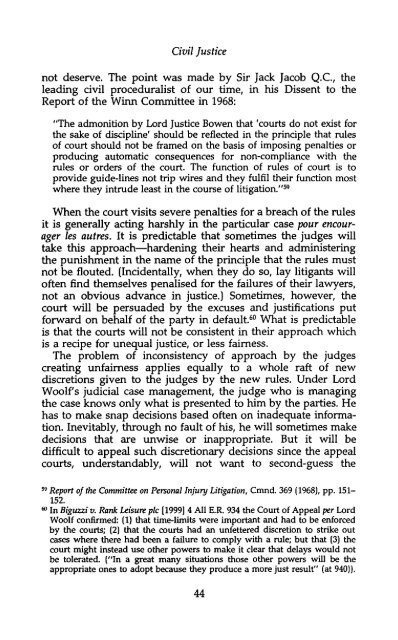HAMLYN - College of Social Sciences and International Studies ...
HAMLYN - College of Social Sciences and International Studies ...
HAMLYN - College of Social Sciences and International Studies ...
You also want an ePaper? Increase the reach of your titles
YUMPU automatically turns print PDFs into web optimized ePapers that Google loves.
Civil Justice<br />
not deserve. The point was made by Sir Jack Jacob Q.C., the<br />
leading civil proceduralist <strong>of</strong> our time, in his Dissent to the<br />
Report <strong>of</strong> the Winn Committee in 1968:<br />
"The admonition by Lord Justice Bowen that 'courts do not exist for<br />
the sake <strong>of</strong> discipline' should be reflected in the principle that rules<br />
<strong>of</strong> court should not be framed on the basis <strong>of</strong> imposing penalties or<br />
producing automatic consequences for non-compliance with the<br />
rules or orders <strong>of</strong> the court. The function <strong>of</strong> rules <strong>of</strong> court is to<br />
provide guide-lines not trip wires <strong>and</strong> they fulfil their function most<br />
where they intrude least in the course <strong>of</strong> litigation." 59<br />
When the court visits severe penalties for a breach <strong>of</strong> the rules<br />
it is generally acting harshly in the particular case pour encourager<br />
les autres. It is predictable that sometimes the judges will<br />
take this approach—hardening their hearts <strong>and</strong> administering<br />
the punishment in the name <strong>of</strong> the principle that the rules must<br />
not be flouted. (Incidentally, when they do so, lay litigants will<br />
<strong>of</strong>ten find themselves penalised for the failures <strong>of</strong> their lawyers,<br />
not an obvious advance in justice.) Sometimes, however, the<br />
court will be persuaded by the excuses <strong>and</strong> justifications put<br />
forward on behalf <strong>of</strong> the party in default. 60 What is predictable<br />
is that the courts will not be consistent in their approach which<br />
is a recipe for unequal justice, or less fairness.<br />
The problem <strong>of</strong> inconsistency <strong>of</strong> approach by the judges<br />
creating unfairness applies equally to a whole raft <strong>of</strong> new<br />
discretions given to the judges by the new rules. Under Lord<br />
Woolf's judicial case management, the judge who is managing<br />
the case knows only what is presented to him by the parties. He<br />
has to make snap decisions based <strong>of</strong>ten on inadequate information.<br />
Inevitably, through no fault <strong>of</strong> his, he will sometimes make<br />
decisions that are unwise or inappropriate. But it will be<br />
difficult to appeal such discretionary decisions since the appeal<br />
courts, underst<strong>and</strong>ably, will not want to second-guess the<br />
59 Report <strong>of</strong> the Committee on Personal Injury Litigation, Cmnd. 369 (1968), pp. 151-<br />
152.<br />
60 In Biguzzi v. Rank Leisure pk [1999] 4 All E.R. 934 the Court <strong>of</strong> Appeal per Lord<br />
Woolf confirmed: (1) that time-limits were important <strong>and</strong> had to be enforced<br />
by the courts; (2) that the courts had an unfettered discretion to strike out<br />
cases where there had been a failure to comply with a rule; but that (3) the<br />
court might instead use other powers to make it clear that delays would not<br />
be tolerated. ("In a great many situations those other powers will be the<br />
appropriate ones to adopt because they produce a more just result" (at 940)).<br />
44

















